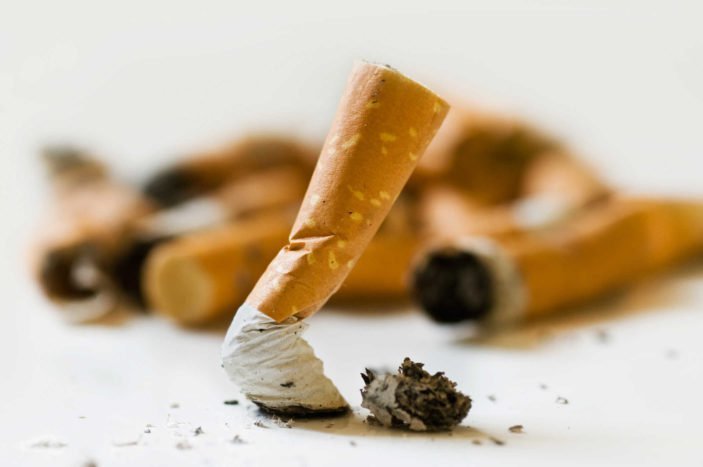Contents:
- Medical Video: Smoking Causes Cancer, Heart Disease, Emphysema
- What are the ingredients in cigarettes?
- What are the effects of smoking on the body?
- Why can smoking affect the body's immune system?
- What are the dangers of smoking for health?
- 1. Damage to the respiratory tract
- 2. Triggering autoimmune conditions
- 3. Inhibiting blood flow
- 4. The number of antibodies decreases
- 5. Reducing antioxidant levels
- 6. Increase white blood cells
- Can reducing the dangers of cigarettes to health?
- Medically, what is the safe limit for smoking every day?
- Why is it so hard to stop smoking?
- Even so, it does not mean quitting smoking is impossible
- 1. Round out intention and determination
- 2. Ask for support from the people around you
- 3. Look for other activities
- 4. Give time
- 5. Always remember what is the reason for you to quit smoking
Medical Video: Smoking Causes Cancer, Heart Disease, Emphysema
The danger of smoking has been proven to cause various chronic diseases such as coronary heart disease, lung cancer, obstructive pulmonary disease and stroke. In fact, these diseases are only part of the danger of smoking to health.
Because, there are many other dangers of smokingwhich a smoker does not realize. For example a decrease in endurance so that they are more vulnerable to infectious diseases. This tends to occur briefly and may cause health impacts on the daily life of a smoker. Check out the full review of the dangers of smoking for health as well as a powerful way to stop smoking below.
What are the ingredients in cigarettes?
Before discussing more about the dangers of smoking for health, you must first know what ingredients are contained in cigarettes. Did you know that many chemicals contained in cigarettes are actually used in some of the products we use everyday?
Yes, don't be surprised if most of the chemicals contained in cigarettes are in fact unusual products that you should not consume everyday. Well, the various ingredients that make cigarettes harmful to your health.
The following are some of the hazardous ingredients contained in a cigarette:
- Acetone: found in nail polish cleansers
- Ammonia: a commonly used home cleaner
- Acetic acid: hair paint ingredients
- Arsenic: used in rat poisons
- Benzene: found in rubber cement
- Butane: used in lighter fluid
- Cadmium: active component in battery acid
- Carbon monoxide: created from exhaust fumes
- Formaldehyde: preservative liquid
- Hexamine: found in barbecue lighter fluid
- Lead: used in batteries
- Naphthalene: ingredients in camphor
- Methanol: the main component of rocket fuel
- Nicotine: used as an insecticide
- Tar: material for paving the road
- Toluene: used for paint
What are the effects of smoking on the body?
Smoking has been known to the public as one of the causes of death that is quite large in the world. Various studies have shown there are many dangers of smoking to health. These include asthma, lung infections, oral cancer, throat cancer, lung cancer, heart attack, stroke, dementia, erectile dysfunction (impotence), and so on.
Even the dangers of smoking for health are not only valid for smokers. Because the people around smokers are at high risk of being affected by the cigarette, even though they themselves do not smoke.
David Currow, a lecturer in the Cancer Institute from New South Wales, Australia told ABC that there are several things that happen to your body when you smoke, including when you just smoke cigarette smoke, including:
- Your blood pressure and heart rate will increase. However, blood flow to your capillary arteries decreases.
- Oxygen levels in the blood are reduced because carbon monoxide in the blood actually increases from cigarette smoke.
- Exposure to chemicals contained in cigarette smoke causes fine hair in the respiratory tract to be damaged. In addition, the small muscles in the respiratory tract will also continue to contract.
- The immune system (immune system) weakens, making you vulnerable to various infectious diseases.
Why can smoking affect the body's immune system?
Cigarettes have various poisons from the chemicals they contain. The main danger of smoking to health comes from poison carcinogens (cancer causes) and carbon monoxide in cigarette smoke. Both of these substances will be inhaled in the respiratory tract, which in turn can trigger organ damage and decreased function of the heart, blood vessels, and respiratory system organs.
As a result, the body will be more difficult to fight the seeds of disease that are in the environment because they have to deal with organ damage and fight poisons from exposure to cigarette smoke.
By smoking, that means someone will be more likely to be exposed to poisons from smoke from cigarettes with a frequency that is more frequent and a long time. The same thing can be experienced by passive smokers. Even the dangers of smoking for health will be more likely to increase if passive smokers breathe the breath released by active smokers.
What are the dangers of smoking for health?
Decreased immune function is characterized by a lack of the body's ability to fight off germs that can cause infection. This can be due to damage to organs and immunity components that cannot work properly when the body lacks the intake it needs, such as oxygen and antioxidants. This is very likely caused by smoking habits. Here are some of the dangers of smoking to health, especially your immune system:
1. Damage to the respiratory tract
Respiratory damage is the earliest effect of smoking which causes a decrease in endurance. Toxins in cigarettes can cause irritation and the appearance of mucus in the respiratory tract which can cause infections in the throat to the lungs.
Infection can also be more vulnerable because cigarette smoke damages cilia, which are small hairs in the respiratory tract that function to catch dust. The more exposure to cigarette smoke, the greater the risk of the infection becoming more serious and causing damage to the air cavity in the lungs.
2. Triggering autoimmune conditions
The impact of cigarettes is not only on the respiratory tract, but also can trigger autoimmune conditions. The poisonous content of carcinogens and tar in a cigarette causes your body to be less effective against inflammation. A weakened immune system is also dangerous because it can trigger autoimmune diseases such as rheumatism and multiple sclerosis.
3. Inhibiting blood flow
The nicotine content in a cigarette can make blood thicker. That's why nutrients, minerals, and oxygen that are spread through the blood cannot be absorbed much and are optimal by the body. The impact of smoking causes inflammation of the outside and internal organs to be healed longer.
4. The number of antibodies decreases
The effects of cigarettes that have entered the bloodstream can reduce the amount of antibodies in your body. Antibodies themselves are blood proteins that play a role in reducing the number of seeds of certain diseases in the body. As a result, smokers will experience a healing period that is longer than usual when they are sick.
5. Reducing antioxidant levels
Antioxidant compounds such as those derived from vitamin C in the blood function to ward off free radicals and repair organ damage. Unfortunately, the effects of smoking make smokers' antioxidant levels less than those who don't smoke. This causes smokers to be sick and the process of healing the pain tends to be long.
6. Increase white blood cells
Just like antibodies, white blood cells also function to fight infection. But in smokers, inflammation and damage that continues to occur causes high levels of white blood cells.
As a result, white blood cells will become less responsive to disease agents and if they occur for a long time can increase the risk of heart attack, stroke, and cancer. This is the impact of cigarettes to watch out for.
Can reducing the dangers of cigarettes to health?
Quitting smoking is the best way to avoid a decrease in endurance to get worse. When a person stops smoking, most of his immune system will get better by itself. This will generally run optimally as long as the person does not have a serious infectious disease such as pneumonia and respiratory tract organ damage.
There are a number of things you can do to reduce the dangers of smoking to health when you are trying to quit smoking, including:
- Improve diet. Meeting the needs of vitamins and minerals will speed up the recovery of the body's resistance. If necessary, complete with certain supplements.
- Fulfill vitamin D intake. Vitamin D is an important component in maintaining endurance. You can fulfill your vitamin D intake from sun exposure or fruit and vegetables.
- Sports. Active moves will help facilitate the circulation of oxygen which is beneficial in the function of the heart and blood vessels so that it can strengthen your body's immune system.
- Avoid sources of disease transmission. Exposure to infectious diseases can occur anywhere. However, avoid patterns of transmission that are very risky such as when in the hospital and contact people who have an infectious disease. Termination of transmission can also be done by maintaining personal hygiene and the environment.
Medically, what is the safe limit for smoking every day?
Researchers from the University of California, San Francisco conducted an evaluation of research on smoking habits and finding out how safe smoking is every day. From various existing research collections, the researchers came to a conclusion that was quite astonishing. The results of this study were later published on the Harvard University website.
For those of you who smoke 1-4 cigarettes per day, here are the effects of smoking on health that might occur.
- The risk of lung cancer increases 2.8 times greater.
- The risk of esophageal cancer increased 4.3 times greater.
- The risk of gastric cancer increases 2.4 times greater.
In fact, for those who only occasionally smoke (not every day), it is known that the numbersdeath rate or the death rate is 1.6 times higher than those who don't smoke at all.
Quoted from WebMD's website, Russell Luepker, a cardiologist from the University of Minnesota's School of Public Health in Minneapolis, United States said that actually smoking has no safe limits at all. Even if you only smoke occasionally, you still increase the risk of various health problems.
Yes, experts say that your risk of getting cancer and various other life-threatening chronic diseases will remain high even if you only smoke occasionally. In other words, experts agree that actuallythere is no safe smoking limit.
Quitting smoking or not smoking at all is the wisest choice to maintain your overall health. Always remember that the impact of smoking is entirely a bad impact, whether it's in terms of your economy or your health. So, in order to avoid the dangers of smoking for health, start quitting smoking now.
Why is it so hard to stop smoking?
Nicotine is the reason why active smokers have a hard time quitting smoking. Nicotine itself is a substance that can naturally be found in tobacco. This substance is as addictive as cocaine or heroin.
Yes, nicotine affects brain performance so that it can trigger dependence. Nicotine can be absorbed by the oral mucosa when smoking, and reaches the brain in just 10 seconds after being sucked. This absorption process is faster than drugs given through blood vessels, such as infusion.
This substance causes dependence by triggering an increase in the hormone dopamine in the brain. This increase in hormones is also accompanied by a decrease in the enzyme monoamineoxidase, which is an enzyme that plays a role in reducing dopamine levels. Without these enzymes, dopamine levels in the body will be more difficult to control, causing dependence, which in turn also changes the way you think and behave.
If you finish spending one cigarette, the body's absorbed nicotine levels will begin to decline. Feelings of pleasure, relaxation and calm that rookok will grow will fade away. This causes you to want to smoke again so you can regain these sensations and feelings.
If you don't immediately smoke, you will experience behavior changes. For example, being more sensitive and easily angry. When smokers smoke again, the feeling disappears and this toxic cycle continues.
In general, the more nicotine absorbed by mouth fluids when smoking, the stronger the effects of dependence that will be experienced by someone. As a result, you will also find it harder to stop smoking.
Even so, it does not mean quitting smoking is impossible
For those of you active smokers, quitting smoking is not easy. Even so, stopping smoking is also not something you cannot do. The biggest temptation when deciding to quit smoking is environmental factors. Yes, living together, working, or spending time with people who smoke can trigger a desire to smoke when you are trying to quit.
Therefore, consider some of the tips below that might help you overcome difficulties in quitting smoking:
1. Round out intention and determination
Given the dangers of smoking for health should not be underestimated, you must commit to immediately stop smoking from now on. Intention and determination are important capital so you can stop smoking. If your intentions and desires are as strong as steel, you can easily ignore the temptations that are in front of your eyes. Don't let anyone shake your confidence in the recovery process. You are on the right path.
Usually, the hardest process of stopping smoking is felt in the first two weeks. Therefore, if you have passed the initial two weeks of quitting smoking, do not let you be tempted to smoke again. The reason is, this will make all the efforts that you have done to be in vain.
2. Ask for support from the people around you
Don't hesitate to ask for help from people around you, if you are at home or friends with fellow smokers. Ask them not to smoke around you or not give you cigarettes, even if you ask yourself. If friends in the office are smokers, ask them not to invite you to smoke together at rest.
3. Look for other activities
When stress comes, the desire to return to smoking usually increases. If you have this, you have to be smart to handle it. Try looking for other activities that can keep you busy and focused on other things.
If you can't stand the vacuum of mouth, you can eat sweets, chew sugar-free gum, or snack on fresh fruit and vegetables. In fact, some people also often bite the straw. You can also keep your hands busy by fiddling with a car or motorcycle engine.
4. Give time
If you are no longer strong, even a cigarette and lighter are already in hand, you can follow these tips. Try to buy time or delay smoking for 10 minutes.
So, if you want to smoke, try to wait for about 10 minutes. Often, after waiting 10 minutes, the desire to smoke is gone, or your mind becomes clear again and you realize that you really don't need cigarettes. Do this every time the desire to smoke returns.
5. Always remember what is the reason for you to quit smoking
If in the end you give up, always remember the reason you want to quit smoking. Try writing down all the list of reasons and place the list of reasons in a place you can see. This is done as a material for self reflection. Especially if the reason you stop smoking is your family, especially parents, children, or partners.




















